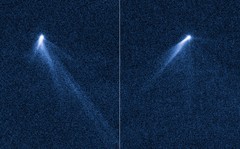On average, only one comet per year can be seen soaring across the sky with the naked eye. If you're very lucky, you might have seen one for yourself, and this picture will look very familiar. But as much as it looks like a comet, this object baffled astronomers when it turned out to be a simple asteroid!
Asteroids are lumps of rock left over from the formation of our Solar System 4.6 billion years ago. From Earth, they look like tiny points of light moving around in the night sky. Many of them, like this one, are located between Mars and Jupiter, in a region called the Asteroid Belt. Comets, on the other hand, are mainly found in the outer edges of our Solar System.
Occasionally, a comet will wander closer towards the Sun. When this happens, it provides a fantastic show for us! Comets are made of rock, dust and ice. If they stray too close to the Sun, the heat evaporates some of the ice. This creates a fantastic “tail” that can be seen as the comet travels across the night sky.
We can see a comet-like tail in this picture. But asteroids aren't made of ice, so how did this one get its tail?
Well, the asteroid is spinning very quickly, causing its weak gravity to struggle to hold the rocky surface together, so it has started flying apart! The six comet-like tails streaming behind the asteroid are actually made of scattered dust and rock!
Cool Fact
So far, maybe 100 to 1000 tonnes of the asteroid's material has been lost. That’s about four times the weight of the Statue of Liberty!
Share:















